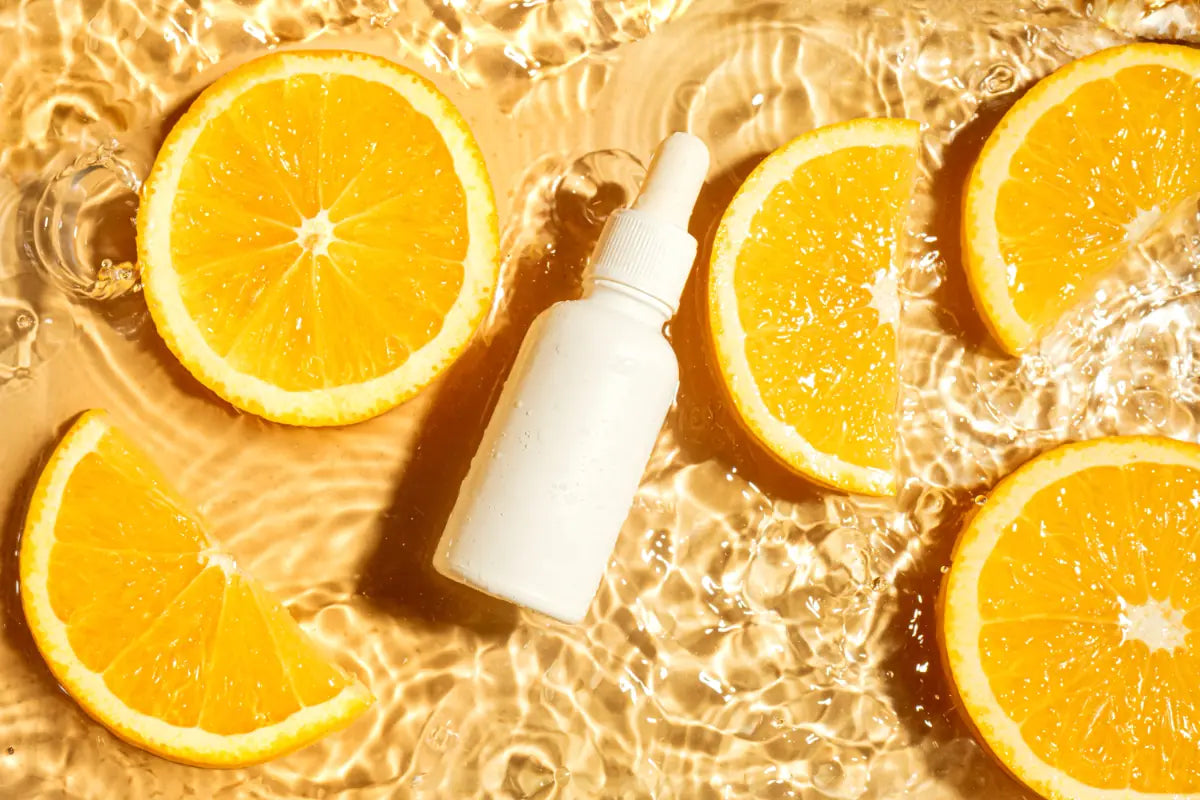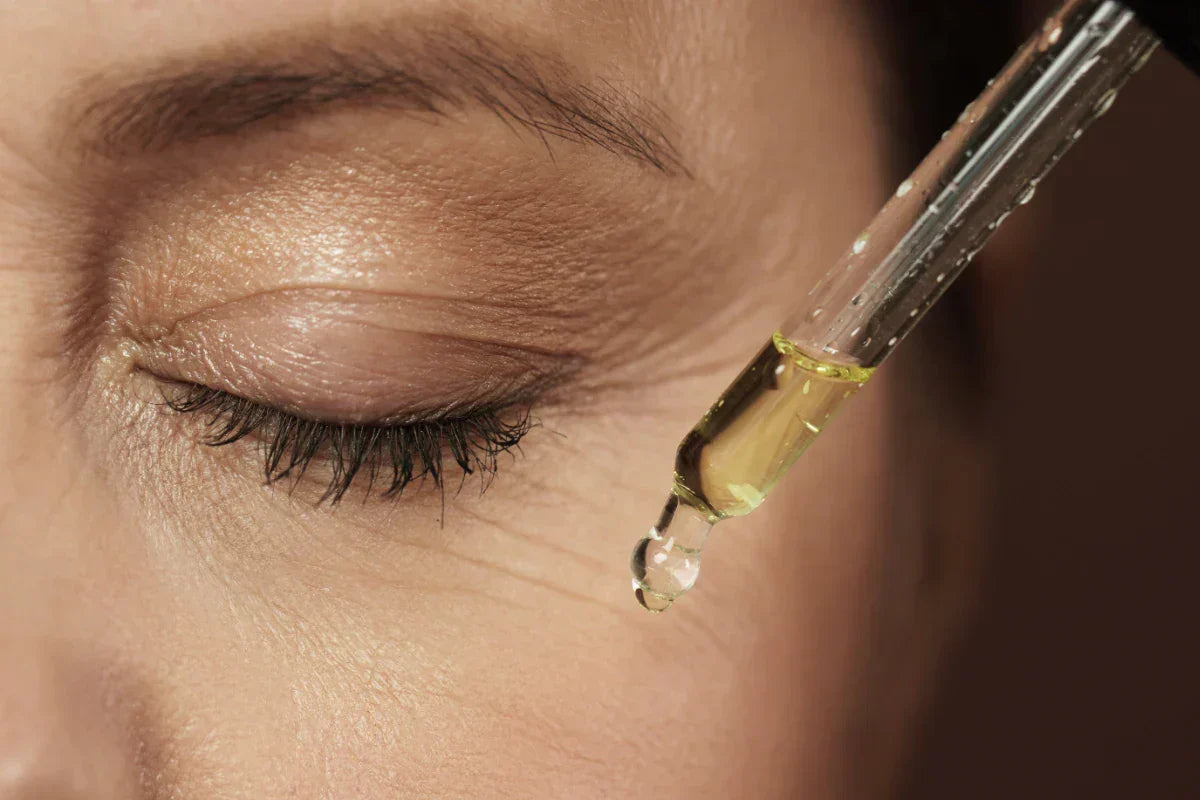In the ever-evolving world of skincare, few ingredients have maintained their superstar status quite like vitamin C, a powerful antioxidant and active ingredient that continues to revolutionize how we approach skin health and radiance. As consumers become increasingly ingredient-conscious, vitamin C in cosmetics has emerged as a non-negotiable element in effective skincare routines.
But what makes this ingredient so special? From boosting collagen production to fading dark spots, vitamin C delivers multiple benefits in one compound. This comprehensive guide will explore everything you need to know about incorporating this powerhouse ingredient into your skincare routine for truly transformative results.
Introduction to Vitamin C
Vitamin C, scientifically known as ascorbic acid, is far more than just an essential nutrient for your immune system; it’s a powerful antioxidant that plays a crucial role in skin health. As one of several important vitamins, vitamin C is found abundantly in citrus fruits, which are well-known for their high vitamin C content and have historically been valued for preventing deficiencies. It occurs naturally in the human body and is involved in the synthesis of collagen and red blood cells.
Unlike many skin-beneficial compounds, the human body cannot produce vitamin C naturally, making topical application through cosmetics particularly valuable. The most effective form of vitamin C in skincare is L-ascorbic acid, which has demonstrated superior penetration into dermal cells compared to other derivatives. This pure vitamin C form is the gold standard in cosmetic dermatology, though it’s notoriously unstable and prone to oxidation when exposed to air, light, or heat. Vitamin C is used in cosmetics under two forms: ascorbic acid and ascorbyl glucoside.
To combat this instability, formulators often pair vitamin C with other antioxidants like vitamin E and ferulic acid. This synergistic combination not only enhances the overall antioxidant protection but also improves product stability, a win-win for both manufacturers and consumers seeking effective skincare solutions. Magnesium ascorbyl phosphate is one of the most stable Vitamin C derivatives used in cosmetics.
Benefits for Skin Health
The remarkable popularity of vitamin C in cosmetics stems from its ability to address multiple skin concerns simultaneously, making it a true multitasker in your skincare arsenal.
Collagen Synthesis and Anti-Aging
Perhaps the most celebrated benefit of topical vitamin C is its role in collagen synthesis. As we age, collagen production naturally declines, resulting in the development of fine lines and a loss of firmness. Collagen is a crucial structural protein in the human dermis, where it helps maintain skin structure and firmness by supporting the network of dermal cells. Vitamin C serves as an essential cofactor for the enzymes responsible for stabilizing and cross-linking collagen molecules.
By boosting collagen and supporting these processing enzymes, consistent use of vitamin C products can help reduce visible signs of premature skin aging. Clinical studies have repeatedly demonstrated improvements in skin elasticity and reduced fine line appearance with regular application.
Brightening and Evening Skin Tone
For those struggling with hyperpigmentation, vitamin C offers powerful brightening properties by inhibiting melanin production. By interfering with the enzyme tyrosinase, which is responsible for skin pigmentation, topical ascorbic acid helps reduce the processes that lead to uneven pigmentation and fade dark spots, sun damage, and post-inflammatory hyperpigmentation.

This makes vitamin C products particularly effective for achieving a more even skin tone and restoring the skin’s natural glow after damage from sun exposure or breakouts.
Protection Against Environmental Damage
While not a replacement for sunscreen, vitamin C provides significant protection against damage from UV exposure and other environmental stressors. It helps reduce the appearance of sunspots, redness, and other visible signs of sun damage caused by UV exposure. By neutralizing free radicals before they can harm skin cells, vitamin C helps prevent photoaged skin and supports your skin’s natural defense mechanisms.
Vitamin C is sensitive to light and is formulated under conditions that preserve its stability. This antioxidant activity makes vitamin C in cosmetics an ideal morning application, working alongside your sunscreen to provide comprehensive protection against environmental aggressors.
Anti-Inflammatory Benefits
The anti-inflammatory properties of vitamin C make it suitable for various skin types, including those with acne or sensitivity. Topically applied vitamin C can help reduce redness, calm irritation, and even help control sebum production, making it beneficial for oily skin and acne-prone complexions. Additionally, vitamin C supports the repair of damaged skin caused by environmental factors such as UV exposure or pollution.
Topical Application
Not all vitamin C in cosmetics is created equal; the form, concentration, and formulation dramatically impact both stability and effectiveness. Topical delivery is also a crucial factor, as it determines how effectively vitamin C penetrates the skin and reaches deeper layers for optimal results.
Forms of Vitamin C
L-ascorbic acid represents pure vitamin C and delivers the most potent results. However, this water-soluble vitamin requires careful formulation at a specific pH (around 3.5) to effectively penetrate the skin barrier.
For those with sensitive skin, vitamin C derivatives like magnesium ascorbyl phosphate offer gentler alternatives with improved stability. While slightly less potent than pure L-ascorbic acid, these derivatives still provide significant benefits with reduced irritation potential.
Concentration Matters
Effective vitamin C concentrations typically range from 5% to 20%, with most clinical studies supporting the 10-15% range as the sweet spot for balancing results with tolerability. Higher isn’t always better concentrations above 20% haven’t demonstrated proportionally increased benefits but may increase irritation risk.
Formulation Synergies
Topical vitamin C works beautifully with complementary ingredients. Hyaluronic acid provides hydration while vitamin C works on brightness and texture. Glycolic acid can enhance exfoliation and improve vitamin C penetration. As mentioned earlier, vitamin E and ferulic acid dramatically improve stability and antioxidant activity.
Skincare Routine
Finding the right vitamin C product for your specific skin needs can transform your results from good to exceptional. Incorporating vitamin C into your skincare routine can lead to a noticeable glow up, resulting in brighter, more radiant skin.
Selecting the Right Product
When choosing vitamin C products, consider your skin type:
- Sensitive skin: Opt for lower concentrations (5-10%) or gentler derivatives like magnesium ascorbyl phosphate
- Oily skin: Fast-absorbing, non-comedogenic serums with L-ascorbic acid work well, potentially combined with salicylic acid
- Dry skin: Look for formulations that combine vitamin C with hydrating ingredients or natural oils
- Mature skin: Higher concentrations (15-20%) of stabilized vitamin C can target multiple signs of aging
Application Best Practices
For maximum efficacy, apply vitamin C to clean, dry skin. Serums are particularly effective delivery systems due to their fast-absorbing, high-concentration formulations. Whether you use vitamin C in the morning (for antioxidant protection) or evening (for repair), consistency is key.

If you’re new to vitamin C, start with a lower concentration and use every other day until your skin builds tolerance. Always remember to patch test new products, especially if you have sensitive skin.
Formulations and Products
The vitamin C market offers a diverse range of options to suit every preference and skin concern.
Serums
Serums remain the gold standard for vitamin C delivery, offering high concentrations in fast-absorbing formulas. These lightweight products typically feature water-soluble L-ascorbic acid and should be packaged in dark, airtight bottles to preserve potency.
Moisturizers and Creams
For those who prefer multitasking products, vitamin C-infused moisturizers offer a combination of hydration and antioxidant benefits. These formulations often use oil-soluble vitamin C derivatives that maintain stability in creamier bases, making them convenient for daily use.
Specialized Treatments
Targeted treatments like vitamin C eye creams address specific concerns such as under-eye circles and fine lines. Spot treatments with higher concentrations can focus on stubborn dark spots and areas of hyperpigmentation.
Product Combinations
Maximizing the benefits of vitamin C often involves strategic combinations with other active ingredients.
Complementary Ingredients
Combining vitamin C with other antioxidants creates a synergistic effect greater than the sum of its parts. Vitamin E and ferulic acid are classic companions that enhance stability and overall antioxidant protection. Hyaluronic acid and peptides make excellent partners with vitamin C, providing hydration and additional collagen-supporting benefits.
Ingredients to Use Separately
While vitamin C plays well with many ingredients, some combinations require caution. Using potent exfoliants like glycolic acid or salicylic acid in the same application as vitamin C may increase irritation for sensitive skin types. Consider alternating these ingredients or using them at different times of day. Vitamin C can interact with Niacinamide, but research suggests they can effectively complement each other. Similarly, while niacinamide and vitamin C can complement each other’s benefits, they’re traditionally used in separate applications to avoid potential formula destabilization.
Stability and pH Sensitivity
One of the biggest challenges with vitamin C in cosmetics is maintaining stability and efficacy. Advanced techniques such as ultrastructural evaluation are used in research to assess the effects of vitamin C formulations on skin at the cellular and structural level.
Preservation Challenges
As a water-soluble vitamin, L-ascorbic acid is prone to oxidation, which reduces its effectiveness. Signs of oxidation include discoloration (turning yellow or brown) and a changed smell or texture. Vitamin C products often utilize innovative airless packaging to protect the formula.
To preserve potency:
- Store products in dark, cool places
- Use products with airtight packaging
- Choose stabilized formulations
- Be wary of clear containers that expose the product to light
pH Considerations
For optimal penetration, L-ascorbic acid requires a pH below 3.5. This acidity is what can cause tingling sensations when applied, but it is necessary for effectiveness. Buffered formulations help minimize irritation while maintaining efficacy.

Skin Irritation and Sensitivity
Understanding Potential Reactions
While vitamin C is celebrated for its powerful antioxidant properties and ability to transform skin, not every skin type reacts the same to topical vitamin C products. Pure forms like L-ascorbic acid, prized for their effectiveness, are formulated at a low pH to maximize absorption.
However, this acidity can sometimes be too intense for sensitive skin, causing mild reactions such as redness, itching, or tingling. These effects are usually temporary and subside as your skin adjusts but can be more pronounced in sensitive or reactive skin types. If you have a history of sensitivity, it’s wise to approach new vitamin C products with care, as even the best antioxidant can cause discomfort if not matched to your skin’s needs.
Tips for Minimizing Irritation
To enjoy all the benefits of vitamin C without irritation, introduce products gradually into your skincare routine, starting with around 10% concentration. Let your skin build tolerance before increasing strength. Choose vitamin C products tailored to your skin type, dry or sensitive skin benefits from hydrating ingredients like hyaluronic acid, while oily or combination skin prefers lightweight serums.
Combining vitamin C with soothing agents such as hyaluronic acid or glycolic acid can buffer irritation and support the skin barrier. Always perform a patch test before full use, especially if you have sensitivity. This helps avoid discomfort and ensures your skin gains all the benefits of this essential vitamin.
Who Should Be Cautious
If you have sensitive skin, oily skin, or are prone to conditions like acne or post-inflammatory hyperpigmentation, it’s especially important to be cautious when adding vitamin C products to your skincare routine. Consulting with a dermatologist or skincare professional can help you select the most appropriate vitamin C product for your unique needs.
They may recommend gentler derivatives, such as magnesium ascorbyl phosphate, which offer many of the same benefits with a lower risk of irritation. By choosing the right formulation and introducing it slowly, you can safely enjoy the antioxidant and brightening effects of vitamin C while minimizing the risk of adverse reactions.
Combination Therapy
Combining vitamin C with other antioxidants and active ingredients can significantly amplify its benefits, making it a cornerstone of advanced skincare routines. When vitamin C is paired with vitamin E and ferulic acid, the result is a powerful antioxidant blend that not only enhances the stability of vitamin C but also provides superior protection against premature skin aging caused by UV exposure and environmental stressors.
This combination is especially effective at boosting collagen synthesis, improving skin tone, and helping to fade dark spots, making it a favorite among those seeking anti-aging properties and a more radiant complexion. Incorporating vitamin C into your skincare routine alongside other actives like glycolic acid or salicylic acid can further enhance results, particularly for those targeting uneven skin tone or texture.
However, it’s important to introduce these combinations gradually and monitor your skin’s response, as using multiple potent ingredients at once can increase the risk of irritation. Look for skincare products specifically formulated to work synergistically; these are designed to maintain the stability and effectiveness of vitamin C while delivering all the benefits of combination therapy.
Consistency is key when it comes to reaping the full benefits of vitamin C and its antioxidant partners. With regular use, you’ll notice improvements in the skin’s resilience, brightness, and overall health. Remember, patience is essential; visible changes such as reduced dark spots and firmer skin may take several weeks to become apparent, but the long-term benefits of vitamin C, especially when combined with other antioxidants, are well worth the wait.
Common Myths and Misconceptions
Despite its popularity, vitamin C in cosmetics is surrounded by persistent myths that can prevent you from maximizing its benefits.
Myth: Vitamin C Is Too Irritating
While L-ascorbic acid can cause tingling or slight irritation due to its acidity, many people tolerate it well, especially when introduced gradually. For sensitive skin, buffered formulations and gentler derivatives provide excellent alternatives.
Myth: Vitamin C Should Only Be Used at Night
Contrary to this common belief, vitamin C’s antioxidant properties make it ideal for daytime use under sunscreen, providing additional protection against environmental damage. It can be used both in the morning and at night, depending on your skincare routine.
Myth: Higher Percentage Always Means Better Results
Clinical studies suggest that concentrations between 10-15% provide optimal benefits for most people. Higher percentages don’t necessarily deliver proportionally better results, but may increase irritation risk.
Incorporating Vitamin C Into Your Routine
Seamlessly incorporating vitamin C into your existing skincare routine requires understanding not just what to use, but when and how to use it. Most people begin noticing improvements in skin tone and brightness within 2-4 weeks. With consistent use, vitamin C can help restore the skin's natural glow, enhancing overall radiance and vitality.
For Beginners
If you’re new to vitamin C in cosmetics:
- Start with a lower concentration (5-10%)
- Apply every other day until skin builds tolerance
- Always patch test before full application
- Consider gentler derivatives if sensitivity occurs
For Skincare Enthusiasts
Those familiar with active ingredients can optimize their vitamin C routine by:
- Using L-ascorbic acid serums in the 15-20% range
- Applying vitamin C in the morning under sunscreen for antioxidant protection
- Combining with complementary ingredients like hyaluronic acid
- Storing products properly to maintain potency
Remember that consistent use delivers the best results. Most people begin noticing improvements in skin tone and brightness within 2-4 weeks, with more significant changes in texture and fine lines appearing after 2-3 months of regular application.
Essential Products
Must-Have Vitamin C Formulations
A basic vitamin C routine might include:
- A quality vitamin C serum - The cornerstone of any vitamin C regimen, delivering concentrated benefits in a fast-absorbing format
- Broad-spectrum sunscreen - Essential for protecting skin and preventing photoaged skin
- Hydrating moisturizer - To complement vitamin C’s effects and maintain skin barrier health
For more comprehensive results, consider adding:
- Vitamin C eye cream - Specifically formulated for the delicate eye area to target fine lines and brightness
- Overnight mask with vitamin C - For intensive treatment during the skin’s natural repair cycle
Conclusion
Vitamin C stands as one of the most researched and beneficial active ingredients in cosmetic science, offering a powerful combination of antioxidant protection, anti-aging benefits, and brightness enhancement that makes it indispensable in an effective skincare routine.
From boosting collagen to neutralizing free radicals, few ingredients can match the multitasking capabilities of this powerful antioxidant. When properly formulated and consistently applied, vitamin C products can dramatically improve the skin’s appearance, health, and resilience against environmental stressors.
Whether you’re targeting premature skin aging, uneven skin tone, or simply want to maintain your skin’s natural glow, understanding how to harness the benefits of vitamin C in cosmetics empowers you to make informed choices for radiant, healthy skin. Vitamin C is especially recommended for women seeking to enhance their complexion and for those engaging in anti-aging processes from the age of 30.
Start with a vitamin C serum that matches your skin type, and within weeks, you’ll understand why this ingredient has earned its permanent place in skincare routines worldwide. Your skin’s future brightness begins with the choices you make today.
Frequently Asked Questions (FAQ)
What Vitamin C ingredients are available in Flychem's portfolio?
We offer premium Vitamin C derivatives, including: Ascovit™ C (3-O-Ethyl Ascorbic Acid 99%) and Ascovit™ SAP (Sodium Ascorbyl Phosphate).
Do you provide regulatory support for your cosmetic ingredients?
Yes, we offer comprehensive regulatory support, including Certificates of Analysis (COA), Technical Data Sheets (TDS), Material Safety Data Sheets (MSDS), and necessary compliance documentation.
Is there a Minimum Order Quantity (MOQ) for Vitamin C ingredients?
We have no strict MOQ restrictions. Our ordering process is flexible, allowing customization of quantities according to your specific requirements.
How quickly can Flychem dispatch Vitamin C ingredient orders?
Orders are typically dispatched within 24 to 48 hours, ensuring timely delivery to support your production schedules.
Can I request customized quantities or samples of Vitamin C ingredients?
Absolutely! Flychem accommodates customized sample quantities and provides samples upon request to help you evaluate the suitability of our products for your formulations.














